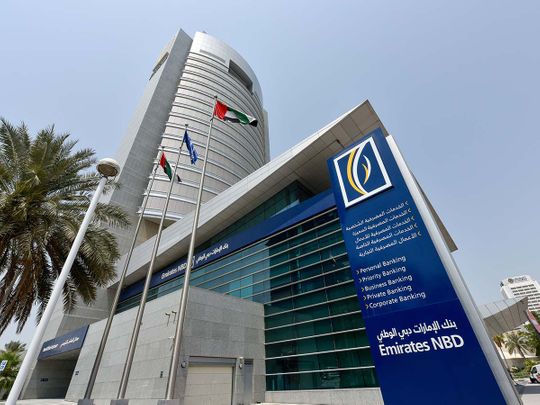
Dubai: Emirates NBD’s net profit jumped 17 per cent on stable margins, effective cost management and a significant reduction in the cost of risk reflecting improved business sentiment.
“The Group’s strong first-half results demonstrate its financial resiliency and the success of its diversified business model. The UAE economy has remained open thanks to the speed and success of the UAE’s vaccination programme,” said Hesham Abdulla Al Qassim, Vice Chairman and Managing Director.
Strong operating performance on higher transaction volumes reflects improving economic conditions coupled with firm cost management.
“Emirates NBD’s profits jumped 17 per cent as the impact of lower interest rates was more than offset by firm cost management and a significant improvement in the cost of risk to pre-pandemic levels,” said Shayne Nelson, Group Chief Executive Officer.
Operating performance
Total income for first-half of 2021 was up 9 per cent to Dh11.54 billion over the preceding half year due to increased transactional activity and stable net interest margins (NIMs). Total income was down 9 per cent year on year as higher non-funded income was offset by a decline in net interest income due to lower interest rates.
Net interest income remained flat over H2 2020 as an improved deposit mix offset lower asset yields and declined 12 per cent year-on-year due to lower interest rates and a decline in DenizBank margins.
Non-funded income was up 41 per cent over the preceding half year and 2 per cent higher year-on-year due to higher activity, an increase in foreign exchange and derivative income and higher investment securities income.
Bank’s net interest margin are stable at 2.45 per cent.
“Margins remained stable as strong CASA [current and savings account] growth helped mitigate lower yields on loans and liquid assets. CASA balances at highest ever level, positioning us well for eventual rate rises,” said Patrick Sullivan, Group Chief Financial Officer.
Expenses for the first-half of 2021 of Dh3.76 b billion improved 2 per cent over the preceding half year due to earlier management actions. Expenses were 6 per cent lower y-o-y due to lower staff and operating costs, and lower costs from DenizBank.
Balance sheet
Total assets remained stable during the first half at Dh694 billion, maintaining a strong asset base. In H1 2021, loans were down 1 per cent due to repayments of corporate loans including loans receiving support and the FX translation impact. In Q2 2021 net loans grew byDh2.1 billion as strong demand for retail loans and renewed growth in corporate and Islamic lending offset the FX translation impact from DenizBank.
Deposits were down 1 per cent in H1 2021 due to Turkish lira depreciation. The deposit mix improved with CASA growing by Dh25 billion, helping replace a Dh27 billion reduction in more expensive fixed deposits.
Asset quality
Impairment allowances in H1 2021 of Dh2,61 billion reduced 30 per cent over the preceding half year and 38 per cent year on year due to improving economic conditions, and following proactive provisioning in 2020.
Impairment allowances were down 38 per cent year on year with cost of risk substantially improving to 114bp, lowest since 2019 pre-pandemic, while still maintaining best-in-class coverage ratios
Liquidity and capital
Liquidity remains strong with the liquidity coverage ratio at 158.8 per cent and the advances to deposits ratio at 95.7 per cent. During the first-half of 2021, the Group raised Dh20.3 billion of senior term funding, more than fully covering this year’s term debt maturities.
During the first-half, the non-performing loan ratio increased marginally by 0.1 per cent to 6.3 per cent whilst the coverage ratio strengthened further to 122.5 per cent.
As at 30 June 2021, the Group’s CET-1 [common equity tier 1] ratio is 15.6 per cent, Tier 1 ratio is 17.6 per cent and capital adequacy ratio is 18.7 per cent.








